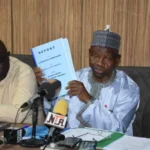Nigeria far from achieving 15% Abuja Declaration on improving Healthcare –– WHO
By Franca Ofili
The World Health Organization (WHO), says Nigeria is still far from meeting the 2001 15 per cent Abuja Declaration on improving the health sector.
Dr Walter Mulombo, WHO Country Representative to Nigeria said this in Abuja in a meeting with newsmen.
The News Agency of Nigeria (NAN) reports that in April 2001, heads of state of African Union countries met and pledged to set a target of allocating at least 15 per cent of their annual budget to improve the health sector
“In Nigeria where a proposed target was set that 15 per cent of total government budget should go to health, until today we are still far from achieving the target,’’ he said.
Mulombo advocated more funding of the health sector to meet the said target, saying the sector was not adequately funded, compared to areas such as defence, and army among others.
According to him, health is a human right and not a luxury or consumable, the more politically wise decisions the country makes now will benefit this nation.
“We need to start talking about human rights violations because it is not acceptable for any child to miss a vaccine,’’ he said.
He said that some areas where the organisation accessed showed that 80 per cent of the money went into tertiary hospitals.
According to him, the primary healthcare is where 80 per cent of the population in the communities get their first exposure to healthcare services .
“The spending itself is distorted. That is the biggest challenge that has generated everything that we have seen.
“Lack of adequate budget to prepare responses to pandemic for instance, we have to struggle in many places,’’ he said.
According to him, the main challenge is the way health is featured as a political choice and unfortunately many governments did not live by standard.
“Many countries continue to consider health as luxury or something that is costing the government money whereas it should have been takeb like an enabling factor for economic and socio-economic development,’’ Mulombo said.
He said it was worrisome the way countries were dealing with social determinants of health, factors like socioeconomic status, education, neighborhood and physical environment, employment, and social support networks and access to health care.
According to him, addressing social determinants of health is important for improving health and reducing longstanding disparities in health and healthcare.
Mulombo advocated more facilities with dialysis machines and more expensive equipment to combat the noncommunicable diseases as such was part of the organisation’s challenges.
He said that the organisation also had the challenges of demographic transition because the facilities that were used during the colonial period were still the same in Africa, although It may be possible that Nigeria had same situation.
“The country is not expending in the space of demographic transition and the way the population is increasing, Nigeria is projected to have more than 400 million population by 2040, 2050,’’ he said.
Mulombo said that there was also the problem of how the county prepares for response of any big outbreaks of pandemics.
He said COVID-19 pandemic was not expected and as such caused havoc in many counties.
“The health body is still expecting flu pandemic and have been preparing for it.
“When COVID-19 pandemic hit the world +, no country was ready not even the U. S. , UK and yet we have International Health Regulations and Global Health Security Agenda.
“The way we prepare was a challenge and the other one was that the demographic transition and the prominence of disease civilisation, Non communicable diseases, our health facilities are not prepared to face these challenges,’’ he said.
The International Health Regulations (IHR) 2005 are a legally binding agreement of 196 countries to build the capability to detect and report potential public health emergencies worldwide.
It requires that all countries have the ability to detect, assess, report, and respond to public health events.
The Global Health Security Agenda (GHSA) is a global effort to strengthen the world’s ability to prevent, detect, and respond to infectious disease threats.
According to him, there is the need for the community to play their roles in identifying their needs and in providing the service to address the challenges.
NAN reports that April 7 every year was dedicated by the United Nations as World Health Day and 2023 also marked the 75th anniversary of the organisation.
The day’s theme was: “Health for All -Strengthening Primary Health Care to Build Resilient Systems” (NAN) (www.nannews.ng)
=============
Edited by Ese E. Eniola Williams
Published By
Has also recently published
 General NewsJune 27, 2024Nigeria requires N348trn to address infrastructure deficit -ICRC D-G
General NewsJune 27, 2024Nigeria requires N348trn to address infrastructure deficit -ICRC D-G BusinessJune 26, 2024Ways and means securitisation responsible for N24trn debt rise – DMO
BusinessJune 26, 2024Ways and means securitisation responsible for N24trn debt rise – DMO SportsJune 26, 2024Paris Olympics: We’re ready to surpass previous achievements – NOC
SportsJune 26, 2024Paris Olympics: We’re ready to surpass previous achievements – NOC Defence/SecurityJune 26, 2024Recruitment: Okiro urges harmony between PSC, Police
Defence/SecurityJune 26, 2024Recruitment: Okiro urges harmony between PSC, Police




